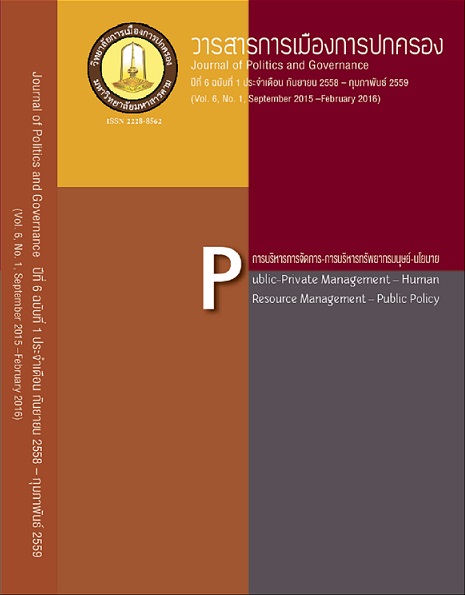Factors related with emotional intelligence and motivation of athletes of institute of physical education in year 2015
Main Article Content
Abstract
The objectives of this research study the were to study primary data, of the emotional quotient and competitive motivation in competition of the students in institute of physical education, and to study factors related to emotional quotient and motivation of athlete students in institute of physical education. Sample group in this research included 367 students, determined by Taro Yamane formal using Stratified Random Sampling. The rating scale of survey questionnaire was used as the research tool. Data was primary analyzed using t-test independent basic statistics, i.e., percentage, mean and standard deviation.
The results showed that most were female students (55.9 %), and the rests were male students (44.1 %). The stutus of the students in institute of physical education were classified as individual (59.7 %). And team (40.3 %), which were athletics (20.2 %), Soccer (20.2 %) and Futsal (9.0 %)
Suggestions
- A person with knowledge, ability, skill and performance in sports was tested with good pleasure to evaluate athletes with the recruiting, selection or value. These measures should improve to standard and adapt to the current situation most.
- The policy of the government should give priority to the development of athletes, and bring sport science to participate in formal hearings. Planning will knowledge in both short and long term directions.
Article Details

This work is licensed under a Creative Commons Attribution-NonCommercial-NoDerivatives 4.0 International License.
References
กระทรวงการท่องเที่ยวและกีฬา. (2554). ยุทธศาสตร์กระทรวงการท่องเที่ยวและกีฬา พ.ศ. 2555-2559. กรุงเทพฯ: โรงพิมพ์องค์การค้าของ สกสค.
ช่อลัดดา ขวัญเมือง. (2542). การศึกษาความฉลาดทางอารมณ์ของนักศึกษาครุศาสตร์สถาบันราชภัฏกลุ่มภาคเเหนือตอนล่าง. วิทยานิพนธ์ ศศ.ม. ลพบุรี: สถาบันราชภัฏพิบูลสงคราม.
เทอดศักดิ์ เดชคง. (2547). คุณลักษณะที่เกี่ยวกับอีคิว. วารสารพฤติกรรมศาสตร์. 5(1): 5-14 ; สิงหาคม.
วรศักดิ์ เพียรชอบ. (2550). การเล่นกีฬาเพื่ออุดมคติของการกีฬา. วารสารสุขศึกษาพลศึกษาและสันทนาการ. 1 (4): 35 ; มกราคม- ตุลาคม.
วีระวัฒน์ ปันนิตามัย. (2549). เชาวน์อารมณ์ (EQ) ดัชนีชี้วัดความสุขและความสาเร็จของชีวิต.กรุงเทพฯ: เอ็กซเปอร์เน็ท.
สุกัญญา ภู่ริยะพันธ์. (2540). การเปรียบเทียบผลของการให้คำปรึกษาเป็นกลุ่มและรายบุคคลตามทฤษฎีเผชิญความจริงที่มีความน้ำใจของนักกีฬาของนนักศึกษาปีที่ 3 กรุงเทพมหานคร. วิทยานิพนธ์ปริญญามหาบัณฑิต. วิชาเอกจิตวิทยาการ แนะแนว มหาวิทยาลัยศรีนครินทรวิโรฒ.
Bekendam, H. (1997). Dennis of Emotional Intelligent : Attachment, Affect Regulation
Alexithymia and Empathy. Dissertation Abstracts International 58 (4):3753-A; December.
Early, J. (1987). Interpersonal Orientation and Motivational Differences between
Team and Individual Sports Participants. Dissertation Abstracts International. 58 (11): 93; Jane.
Gerry, I. (1997). Exploratory Study of the Ways in which Superintendents use Their Emotion Intelligence to Address Conflict in Their Educational Organizations (Leadership). Dissertation Abstracts International. 58(11) : 4137-A ; June.
Tapia, M.L.(1999). A study of the emotion intelligence inventory. Dissertation Abstract International, 56(9), 4389-A
Weisinger. H. (1998). Emotional Intelligent at Work: The Untapped Edge for Success. San Francisco : Jossey – Bass.
Willis. Joe D. (1998) . The Relationships Between Competitive Motives and Ratings of Competitiveness. Doctor’s Thesis Monash : Monash University,
Frederick. C. M. (1991). An investigation of The Relationships Among Participation Motives Level of Level of Participation and Psychological Outcomes in The Domain of Physical Activity. Doctor’s Thesis. Rochester : The University of Rochester.
Sutaso, D.(1998). Gender differences on the emotional intelligence inventory (EQI)(marital status). Doctoral dissertation, 30(3),112.


